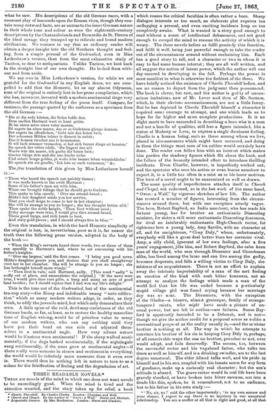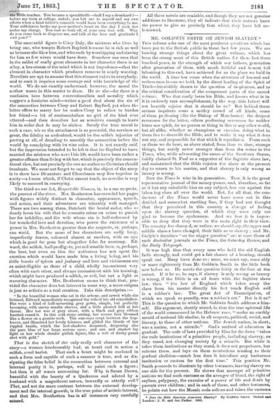THREE READABLE NOVELS.* THERE are moods of the mind in
which one does not want novels to be exceedingly good. When the mind is tired and the attention wearied, and the story taken up for relief, a book
* Charlie Thornhill. By Charles Clarke. London: Chapman and Hall. • Church and Chapel. By the Author of "Owen : a Wait" Hurst and Blackett. itespeetable sinners. By Hrs. Brotherton. London: Hurst and Blacken.
whichrouses the critical faculties is often rather a bore. Sharp dialogue interests us too much, an elaborate plot requires too unflagging a perusal, and even exciting incidents keep us too completely awake. What is wanted is a story good enough to read without a sense of intellectual debasement, and not good enough to compel the mind to resume the activity of which it is weary. The three novels before us fulfil precisely this function, and fulfil it well, being just powerful enough to take the reader out of the circumstances around without enchaining him. Each has a good story to tell, and a character or two in whom it is easy to feel some human interest ; they are all well written, and all suggest the notion of latent power, which the author will one day succeed in developing to the full. Perhaps the power is most manifest in what is otherwise the feeblest of the three. We have briefly noticed the existence of Charlie Thornhill before, and see no reason to depart from the judgment then pronounced. The book is clever, but raw, and the author is guilty of uncon- scious imitations, now of Mr. Lever and then of Mr. Surtees, which, in their obvious unconsciousness, are not a little funny. But he has depicted in Charlie Thornhill himself a character it required some courage to attempt, and one which leads us to hope for far higher and more complete productions. It is no slight merit to have succeeded in describing a hero who is a man and not a bundle of qualities, still less a figure intended, like a statue of Modesty or Love, to express a single dominant feeling. Charlie is a human being, such as those among whom we live, placed in circumstances which might have occurred, and doing in them the things most men of his calibre would certainly have done. The reader can follow him with an intercist which makes him pardon the shadowy figures which flit about the book, and the failure of the honestly intended effort to introduce thrilling incidents. Even Charlie, however, is imperfectly worked out, and the spectator who sees his action or even learns somehow to expect it, is a little too often in a mist as to his inner motives. The hero of a novel ought to be anatomized as well as drawn.
The same quality of imperfectness attaches itself to Church and Chapel, not redeemed, as in the last work of the same hand, " Owen : a Waif,' by vigorous sketches of low life. The author has created a number of figures, interesting from the circum- stances around them, but with one exception' utterly vague. The hero, Robert Bayford, an India merchant, who has made his fortune young, has for brother an enthusiastic Dissenting minister, for sister a still more enthusiastic Dissenting deaconess, for rival an intolerably enthusiastic High-Church rector, for righteous love a young lady, Amy Saville, with no character at all, and for unrighteous, " Cissy Daly," whom, unfortunately, everybody will like a great deal better than her correcter rival. Amy, a silly child, ignorant of her own feelings, after a five years' engagement, jilts him, and Robert Bayford, the calm keen man of the world, who sees through Dissenter ana Churchman alike, has lived among the loose and can live among the godly, becomes desperate, and falls a willing victim to Cisay Daly, the mistress of an acquaintance. There is not an effort to explain away the intrinsic improbability of a man of the sort feeling an emotion of the kind with such bitter keenness, not an attempt to analyze the feelings which made a man of the world feel that his life was ended because a particularly stupid village girl was found crying because her marriage day was 81 near. The Dissenters, with the exception of the Glades—a bizarre, almost grotesque, family of strange- tempered saints, who might have made a picture of un- usual power, but are left in outline—are failures. Susan Bay- ford is apparently intended to be a Deborah, and is not— though we give the author credit for a proposal scene as unlike a conventional proposal as the reality usually is,—and the in:nister brother is nothing at all. The way in which he attempts to convince his brother of his sin in keeping Cissy Daly is, perhaps, of all conceivable ways the one no brother, preacher or not, ever would adopt, and fails deservedly. The scenes, too, between the successful rector and his vagabond father, who talks ten times as well as himself, and is a drinking swindler, are to the last degree unnatural. The elder Alland talks well, and his pride in himself and in his son, coupled with his innate scorn for any form of goodness, make up a curiously, real character ; but the son's altitude is absurd. The grave rector would in real life have been gravely shocked, or have broken into bitter sarcasm, not into a tirade like this, spoken, be it remembered, not to an audience, but to his father in his own study :— "'No, sir, no !' said the other impetuously ; to my own sorrow and your shame, I regret to say there is no mystery in our unnatural relationship. You are a scoffer at all that is right and good, at all that tble teaches. You became a spendthrift--shall I say a drunkard ?— before my term at college ended ; you left me to myself and my own efforts when a kind father's counsels would have been everything to me. Your selfishness broke my poor mother's heart on the day I took her under my charge. You cast us both off, of your own free will. Why do you come back to disgrace me, and talk of the love and gratitude I owe you 2'"
The successful figure is Cissy Daly, the mistress who lives by being one, who tempts Robert Bayford because he is rich as well as because she likes him, and who ends by worshipping and slaving for him as few wives would have done. Somehow one sees that in the midst of really great elements in her character there is an alloy, a brassiness of the mind which is not impudence—that the element in character which produces remorse is nearly wanting. Novelists are apt to assume that this element exists in everybody, and to Omit it requires some courage and wide knowledge of the world. We do not exactly understand, however, the moral the author wants in this matter to draw. He or she—for there is a confusion here between conventionalism and morality which suggests a feminine mind—writes a good deal about the sin of the connection between Cissy and Robert Bayford, yet when the latter offers to marry her he makes Cissy to refuse to burden her friend—a bit of sentimentalism no girl of the kind ever uttered—and then describes her as sensitive enough to leave him in order that he may be sinless. Surely the true moral in such a case, whsre the attachment is so powerful, the services so great, the fidelity so undoubted, would be the selfish injustice of parting at all, of dreading to sanctify the connection before the world by complying with its wise rules. It is not exactly said, but the impression intended to be left is that for Bayford to have married the mistress who save I his life would have been rather a greater offence than living with her, which is precisely the conven- tional view, but not precisely the one an author so Christian should inculcate. We must not forget to say that the object of the story is to show how Dissenters and Churchmen may live together in amity—a lesson which, if Christ cannot teach, no novelist is very likely to succeed in conveying.
The third on our list, Respectable Sinners, is, in some respects, the poorest of the three. Mrs. Brotherton has crowded her pages with figures widely distinct in character, appearance, speech, and action, and their adventures are tolerably well managed. There are two among them, Datchett the brutal sailor, who so dearly loves his wife that lie commits crime on crime to punish her for infidelity, and the wife whose sin is half-redeemed by her wonderful love and devotion, who prove the existence of a power in Mrs. Brotherton greater than she suspects, or, perhaps, can wield. But the mass of her characters are sadly hazy, imperfectly drawn, coloured almost at random, with an eye which is good for pose but altogether false for anatomy. Ed- ward, the selfish, half-profligate, yet rede.emable hero, is, perhaps, the best, but even on him the authoress has not spent the exertion which would have made him a living being, and his little bursts of spleen and jealousy and love and viciousness are as unintelligible as those of a child, wholly inconsistent very often with each other, and always inconsistent with his training, which might have produced a selfish, or evil, but not a light or wavering character. Mrs. Brotherton seems to think that, pro- vided the character does but interest in some way, a mere enigma is just as artistic as a real creation. Take this description :—
" In. the beautiful woman who sat in the arbour, and sewed while she listened, Edward immediately recognized the wife of his old schoolfellow. She wore a kind of half-mourning grey gown, simple, but perfectly becoming, with snowy muslin sleeves, and a little pleated frill at her throat. Her hat was of grey straw, with a black and grey ribbon knotted round it. In this cold stony setting, her serene face bloomed like a flower on a granite rock. The sun-rays crept between the hop- leaves, and illumined her lovely fairness, and gilded the blonde of her rippled braids, which the leaf-shadows deepened, deepening also the pure blue of her large serious eyes ; and sun and shadow lay light on her whole slender girlish figure, like a web of dusky gauze shot with gold."
That is the sketch of the only really evil character of the story—a woman irredeemably bad, at heart and in action a selfish, cruel harlot. That such a heart might be enclosed in such a form and capable of such a manner is true, and as dis- sipating the false belief in the connection between external and internal purity it is, perhaps, well to paint such a figure ; but then it all wants accounting for. Why is Susan Drewe, beautiful with the beauty of a Quakeress and adored by. a husband with a magnificent nature, inwardly so utterly evil ? That, and not the mere contrast between the external develop- ment and the internal growth, is the true point of artistic interest, and that Mrs. Brotherton has in all instances very carefully missed.
All these novels are readable, and though they are not genuine additions to literature, they all indicate that their authors have the power to give us precisely that which they have left uu- bestowed.































 Previous page
Previous page